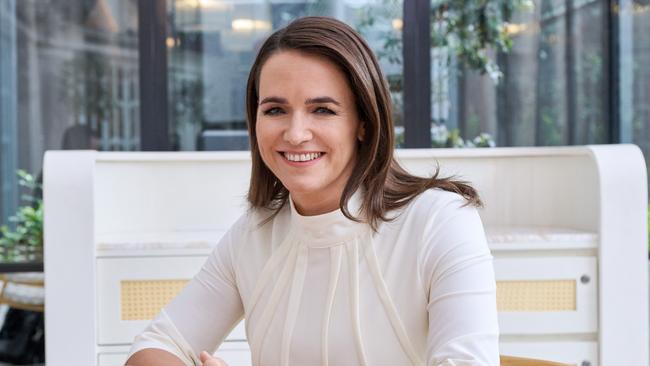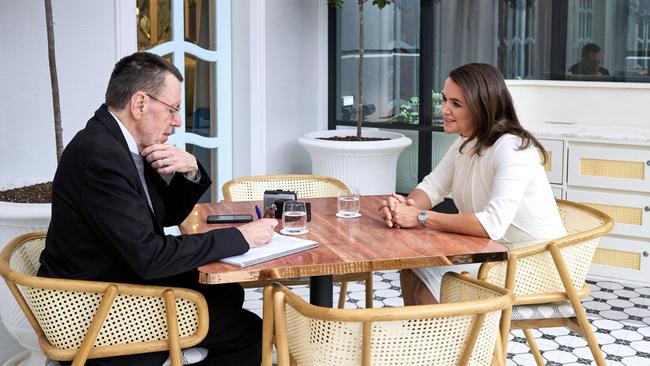Hungary’s President defies Western feminism, wants more Christian kids
Shortly after the Hamas atrocities in Israel, an almost unique event took place in Budapest. A ceremony of solidarity with Israel was conducted in the city’s main synagogue.

Shortly after the Hamas atrocities in southern Israel, an almost unique event took place in Budapest, Hungary’s breathtakingly beautiful capital. A ceremony of solidarity with Israel was conducted in the city’s main synagogue.
There was the chief rabbi, the cardinal of the Catholic Church, the head of the Calvinist Protestant church and – this was really amazing – leaders from the different Hungarian political parties who normally detest each other. There, too, was Hungary’s President, Katalin Novak, 46, the gentlest face of Viktor Orban’s ruling Fidesz Party, though she emphasises that as President she is not part of the government.
However, she bristles at the idea that Orban’s government or Hungary is in any way anti-Semitic. “Having the different political parties join together at the service, that is unusual in Hungary,” she tells me in a long discussion in Melbourne this week.
“In Hungary we have zero tolerance of anti-Semitism. We stood that day with Israel and with the Jewish people. We have a very strong Jewish community in Hungary. They enjoy complete rights and freedoms. In Hungary, Jewish people are always telling me that they never have to be worried about wearing a kippah (Jewish skullcap) in public or expressing their Jewishness.”
Hungarian Jews are not, she says, harassed on the street or subject to assault or vandalism, a marked contrast to the situation in some other European nations, especially France and Britain.
Yet if there is a single weird trope about the Orban government, it’s that it is anti-Semitic. This seems to come entirely from Orban’s dislike of George Soros, a billionaire who funds left-liberal causes around the world and happens to be Jewish.
Hungary has an at times shocking history of anti-Semitism, especially at the end of World War II, though that was under a Nazi-installed government. And one of the big parties in Hungary now, Jobbik, has a recent history of extreme-right rhetoric. But is the Orban government, and today’s Hungarian nation, in any way extreme right wing, much less anti-Semitic?
Back in 2019 I asked the Orthodox Chief Rabbi in Budapest, Shlomo Koves, whether Jews felt unhappy in Hungary and whether they were subject to ongoing anti-Semitism. “Hungary’s Jewish community is one of the safest and best treated in Europe,” he replied. “Many in the Western media call the Hungarian government extreme right wing and anti-Semitic. In my view this is total nonsense and just part of the language games of left liberals.”
In the 1930s, Koves suggested, if a leader described themselves as a Christian politician, they probably meant, pointedly, that they weren’t Jewish. Today, they just mean they’re not secular.
Back to Novak: “I am a mother, a wife, a Hungarian, a Christian believer – these all define me and I can’t put them aside. My faith is very important to me. I’m an everyday Bible reader.
She wants to make public Christianity a bit more normal for politicians: “In Hungary we don’t really have this tradition of confessing our faith in public. Being among very few women national leaders, less than 20 in the world, I want to show a conservative narrative about what it means to be a woman politician.”
Novak is no fundamentalist, not someone imposing her values on others. But her public Christianity makes her, by West European standards, an authentic radical. She’s a strong Calvinist Reformed Christian. Hungary wants to continue its Christian heritage. She’s politely aghast at the way Hungary is caricatured in Western media: “When my country and the Hungarian people are pictured as non-democratic and against freedom, it’s very difficult to understand why people, most of whom have never been to Hungary, can have such a strong, clear misperception.”
So why does the international media so often get Hungary so wrong? “First, they don’t understand the Hungarian language. Second, very often the Hungarian narrative doesn’t fit into the mainstream (liberal) narrative. And third, I am also a self-critic, we don’t put enough effort into clarification.” Much international media only want to hear certain types of stories about Hungary.

Novak was interviewed for an hour by a major European news outlet, but because her answers weren’t what they wanted they didn’t run a word: “It’s difficult to accept that kind of liberalism, and it’s not easy to get through that kind of narrative.”
The recent election in Poland saw the defeat of the centre-right government. With Orban’s Hungary, Poland had provided the strongest resistance to the left liberalism of the EU on social policy and immigration. At times the left-liberal international consensus from Brussels to Paris, from Berlin to the Guardian bunkers of London, as well as The New York Times and universities across the West, seems to assume if a nation doesn’t embrace all the social values of San Francisco, it’s automatically to be regarded as the Taliban. Whether the age of Hamas atrocities will change that is unclear.
Despite the narrow win for the centre left in Poland, conservatives across Europe now vigorously contest this consensus. They are having surprising successes, especially where they’re led by out and proud conservative women, such as Italy’s Giorgia Meloni, of whom Novak says: “I have a very good personal friendship with Giorgia Meloni and what she’s doing is very good for Italy.” Perhaps the rise of Liberal-National Party senator Jacinta Nampijinpa Price is the nearest Australian equivalent.
Three themes emerge from conversation with Novak – the Hungarian commitment to human freedom, the need to bolster families and encourage more children, and Budapest’s desire to remain, culturally, a country in the Christian tradition.
This is not at the expense of religious freedom: “We Hungarians are freedom fighters. This is the anniversary of the 23 October, 1956 Hungarian rebellion (against Soviet rule). For us, freedom is our inheritance. That goes to the exercise of faith. Everybody can freely exercise their faith in Hungary. We are historically a Christian country. We have an 1100-year history as a Christian nation. Our first king chose Christianity for us. As a reformed Christian, I would say we were predestined for Christianity.
“It’s also cultural Christianity, we have Christian holidays, habits, literature, arts. Nowadays, many (in the West) think you can only be tolerant if you give up your national identity and your Christian identity.”
Novak wants Hungarian women, and families, to have real choice. While she expresses this point gently, Western feminism has tended to shut down one side of that choice. Novak’s vision of womanhood and its possibilities diverge radically from The New York Times-Guardian zeitgeist.
“Nowadays young people want to have children but don’t end up having as many as they want,” she says. She cites a Hungarian online survey of 100,000 people that asked how many kids they would like; 12 per cent said no kids, 5 per cent wanted just one child, 12 per cent said two and 59 per cent said they’d like to have three or more children, she says.
It is safe to say Novak is the most pro-child leader of any Western government.
“Young people want to have families. As a conservative woman leader, my question is: why can’t they? My role is to enable them to have families, not to coerce them. I never hear anyone regret having too many kids. At the end of their lives, nobody says: I wish I had more meetings at the office. This is my No.1 issue. We have to face reality. It’s important to tackle the demographic challenge. No Western nation has a fertility rate at replacement level, no country in the EU, not the US, not Australia. Look at South Korea, one of the most successful countries economically – its fertility rate has gone down to 0.8 or just below.”
“We have a responsibility to speak about this topic much more, and in a much more outspoken way. Biology hasn’t changed, A person’s fertile years pass quickly.”
As families minister, Novak worked to increase Hungary’s fertility rate. It was 1.21 in 2011, now it’s 1.56, a big increase, but still way below replacement level, which is 2.1. Since 1981 Hungary’s population, now 10 million, has been slowly declining. Hungary devotes 6 per cent of GDP to pro-family policies, including a provision that a family with four children pays no income tax.
Hungary could just import a lot of people. Novak says: “Immigration can be a legitimate response but it won’t solve the problem. The Hungarian people don’t consider mass immigration the solution to the demographic problem.”
Immigration is the other issue Hungary is routinely lambasted for. But its policies are identical to Australia’s. It accepts that refugees have the right to flee to the next available safe country. It doesn’t accept at all that mass population movements from North Africa and the Middle East can choose to relocate to Europe, and indeed to whichever bit of Europe they want.
“The fertility rate now (in the West) really is very alarming. It compromises the sustainability of the economy, of health care, of pensions.
“A positive family policy approach is not just a matter for the state, it involves companies and the whole civic society. All should unite in a pro-family approach. It’s as much cultural as financial. Hungarian people are sympathetic to traditional families and traditional family values.”
Hungary has assisted two million Ukrainian temporary and long-term refugees. Most have moved on to other European nations or returned to Ukraine, but hundreds of thousands are still in Hungary. Budapest officials see them as genuine refugees who have fled across the international border to the nearest safe country, in this case Hungary.
Novak also objects to the presentation of Hungary as some kind of ally of Russia. “We condemn the Russian invasion,” she tells me, as other Hungarian ministers and political leaders have also told me. “We’ve helped nearly two million Ukrainians, but we also want to get to a peace settlement as soon as possible.”
Novak is the highest of achievers, a mother of three, a career diplomat, a successful politician, for several years minister for families, a key job in Hungary, and now President.
“I consider motherhood a privilege,” she says. “It’s a privilege that we can give birth to a child. Of course we can decide to give that up. But I want to show motherhood as a good, as a privilege, we should strive for that.
“What I see is that younger girls and women always hear the message that they must compete with the man. They don’t hear that they can co-operate with the man. Many university students tell me they’re encouraged by my message not to be afraid of child-bearing. I want to make them believe they’re capable of that. Being a working mother is difficult of course.
“As much as it’s great for some women to dedicate their whole lives to children, it’s the duty of government to provide the opportunity to do both. I believe in real freedom of choice. Think of the value of human life. We leaders need to provide information about what life is really about.”
In Australia, Novak is meeting the substantial Hungarian diaspora, which swelled historically after the Russians crushed the 1956 Hungarian uprising: “I’m very grateful to Australia for welcoming Hungarian refugees and for giving them a second home. It’s really great to see them find such a welcoming place, where they can exercise their rights fully. This is very valuable and a good example.”
She’ll also be involved in dedicating at least one new church. Though she doesn’t try to impose her religious values, she takes religion profoundly seriously in her own life. Hungary has a big program to assist Christians in distress around the world.
She wanted to visit Hungarian soldiers doing aid work in Kurdish areas of Iraq. “Sometimes the Bible can give you very direct messages,” she says. “Everybody told me it was too dangerous. But as I say I’m a daily Bible reader. The reading that day, which had been chosen a long time before, was from the Book of Jonah. God instructs Jonah to go to Nineveh. That’s where I was supposed to go. So I went there. For me, Christianity is where my strength and consciousness comes from. I know who I’m responsible to. Faith and children help you make decisions for the long run.”
She leaves me with a final anecdote. When she first became President she was left alone in her office and for a moment was overwhelmed with feeling about the situation, the responsibility, the opportunity, that she faced. She tried to ring one or two people, but they were busy. Then she paused in prayer: “I realised I always have someone I can confide the deepest things in.”






To join the conversation, please log in. Don't have an account? Register
Join the conversation, you are commenting as Logout